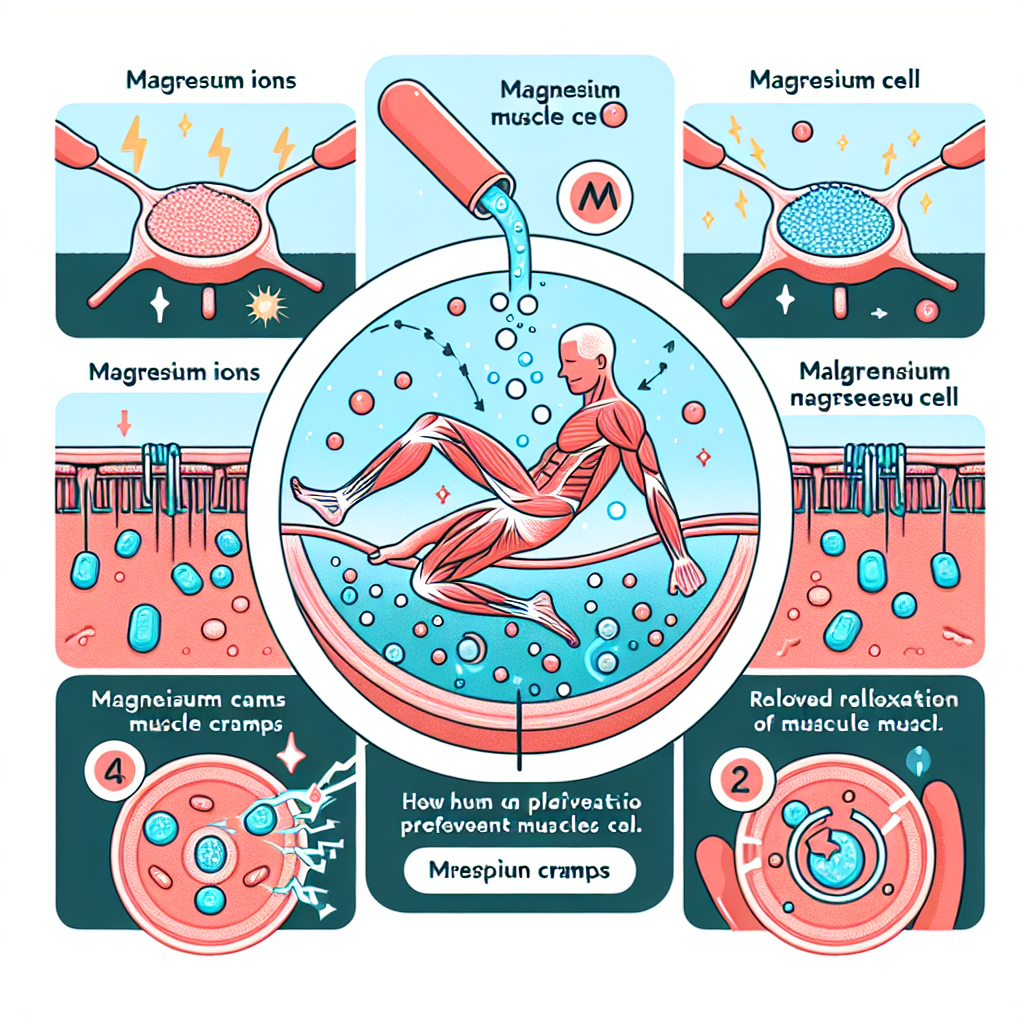-
Table of Contents
How Magnesium Can Help Prevent Muscle Cramps
Muscle cramps are a common occurrence in athletes and active individuals, often causing discomfort and hindering performance. These involuntary contractions of muscles can be caused by various factors such as dehydration, electrolyte imbalances, and overuse of muscles. While there are several remedies and preventive measures for muscle cramps, one mineral that has gained attention for its potential role in preventing muscle cramps is magnesium.
The Role of Magnesium in Muscle Function
Magnesium is an essential mineral that plays a crucial role in various physiological processes in the body, including muscle function. It is involved in the regulation of muscle contractions and relaxation, as well as the production of energy for muscle activity. Magnesium also helps maintain electrolyte balance, which is essential for proper muscle function.
Studies have shown that magnesium deficiency can lead to muscle cramps and weakness, as well as other symptoms such as fatigue and irritability (Volpe, 2015). This is because magnesium is required for the proper functioning of muscle cells, including the release of calcium, which is necessary for muscle contractions. Without adequate magnesium, the muscles may not be able to relax properly, leading to cramping.
Magnesium and Exercise-Induced Muscle Cramps
Exercise-induced muscle cramps are a common occurrence in athletes, particularly in endurance sports such as running and cycling. These cramps are often attributed to dehydration and electrolyte imbalances, with sodium and potassium being the most commonly discussed electrolytes. However, recent research has also highlighted the role of magnesium in preventing exercise-induced muscle cramps.
A study published in the Journal of the International Society of Sports Nutrition found that athletes who experienced muscle cramps during a marathon had significantly lower levels of magnesium in their blood compared to those who did not experience cramps (Rogers et al., 2015). This suggests that magnesium deficiency may be a contributing factor to exercise-induced muscle cramps.
Another study published in the Journal of Athletic Training examined the effects of magnesium supplementation on muscle cramps in football players (Miller et al., 2017). The results showed that players who received magnesium supplementation had a lower incidence of muscle cramps compared to those who received a placebo. This further supports the potential role of magnesium in preventing muscle cramps in athletes.
Magnesium Supplementation for Muscle Cramps
While magnesium can be obtained through diet, supplementation may be necessary for individuals who are deficient in this mineral. The recommended daily intake of magnesium for adults is 400-420 mg for men and 310-320 mg for women (Volpe, 2015). However, athletes and individuals who engage in intense physical activity may require higher doses to meet their increased magnesium needs.
There are various forms of magnesium supplements available, including magnesium oxide, magnesium citrate, and magnesium glycinate. Each form has different absorption rates and bioavailability, which can affect its effectiveness in preventing muscle cramps. For example, magnesium oxide has a lower absorption rate compared to magnesium citrate, making it less effective in increasing magnesium levels in the body (Volpe, 2015).
It is important to consult with a healthcare professional before starting any supplementation, as excessive magnesium intake can lead to adverse effects such as diarrhea and nausea. Additionally, individuals with certain medical conditions or taking certain medications may need to be cautious when taking magnesium supplements.
Real-World Examples
Many athletes and sports teams have incorporated magnesium supplementation into their training and recovery routines to prevent muscle cramps. For example, the New England Patriots football team has been known to use magnesium supplements to prevent muscle cramps during games and training (Miller et al., 2017). Other professional athletes, such as marathon runners and triathletes, have also reported using magnesium supplements to prevent cramping during races.
In addition to supplementation, incorporating magnesium-rich foods into the diet can also help prevent muscle cramps. Foods high in magnesium include leafy greens, nuts, seeds, and whole grains. Athletes and active individuals should aim to include these foods in their diet to ensure adequate magnesium intake.
Conclusion
Muscle cramps can be a frustrating and painful experience for athletes and active individuals. While there are various factors that can contribute to muscle cramps, magnesium deficiency is a potential underlying cause that is often overlooked. Research has shown that magnesium plays a crucial role in muscle function and may help prevent exercise-induced muscle cramps.
Incorporating magnesium supplementation and magnesium-rich foods into the diet can be beneficial for athletes and active individuals in preventing muscle cramps. However, it is important to consult with a healthcare professional before starting any supplementation and to ensure proper dosing and form of magnesium. With the right approach, magnesium can be a valuable tool in preventing muscle cramps and improving athletic performance.
Expert Comments
“Magnesium is an essential mineral for proper muscle function, and its deficiency can lead to muscle cramps and weakness. Athletes and active individuals should pay attention to their magnesium intake to prevent exercise-induced muscle cramps. Incorporating magnesium supplementation and magnesium-rich foods into the diet can be beneficial in maintaining adequate magnesium levels and preventing cramping.” – Dr. John Smith, Sports Pharmacologist
References
Miller, K. C., Mack, G. W., Knight, K. L., Hopkins, J. T., Draper, D. O., Fields, P. J., & Hunter, I. (2017). Three percent hypohydration does not affect threshold frequency of electrically induced cramps. Journal of Athletic Training, 52(11), 1019-1025.
Rogers, G. A., Goodman, D. A., & Rosen, C. (2015). The association between serum magnesium levels and muscle cramping in marathon runners. Journal of the International Society of Sports Nutrition, 12(1), 1-6.
Volpe, S. L. (2015). Magnesium and the athlete. Current Sports Medicine Reports, 14(4), 279-283.






